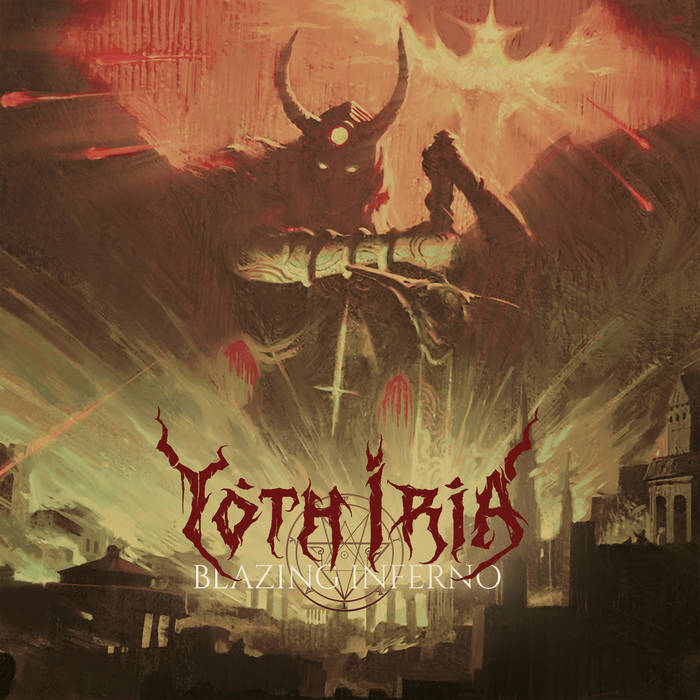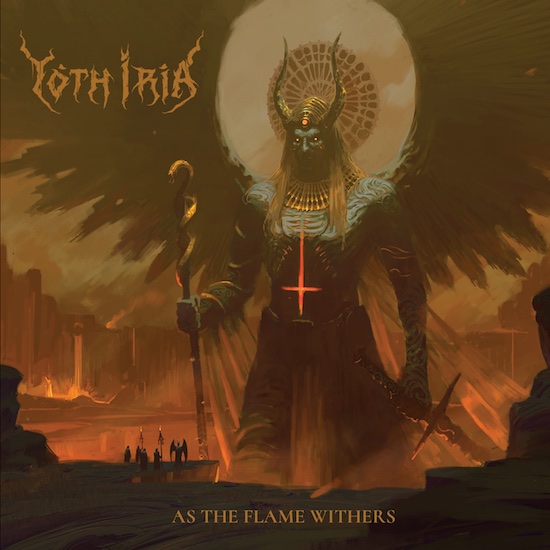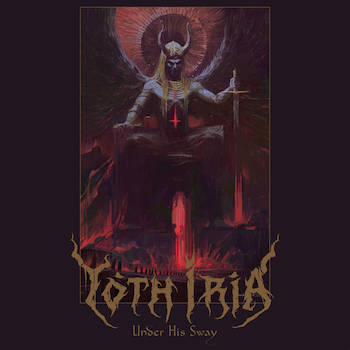Yoth Iria - Interview
Since the earliest days of Rotting Christ and even before, Jim Mutilator has been a larger-than-life presence within the legendary Greek black metal scene. From his Black Church days and through the Rotting Christ era until now - the age of Yoth Iria - Jim has etched his name into the hallowed halls of black metal legend, and not just in Greece, but across the globe. To know Hellenic black metal is to have felt his impact, and being afforded the honor to interview him is something I will always hold dear.
Yoth Iria is the brainchild of Jim's sacred vision for BM. The band incorporates all of the familiar warmth, theatrics, and melody of traditional Greek black metal while also providing the taker in with a look into the realm of the Daemon of the New Millennium - Yoth Iria itself… Romantic Satanism; great stories told and portrayed through the lens provided by the true friends of humanity - the Daemons themselves. So much more than typical Devil worshipping black metal and so much more than animalistic blasphemy, this is black metal for the ages! Timeless and brilliant, spiritual and profound.
A great mystery is about to be unlocked. Everything you've ever wanted to know about Jim Mutilator is about to be revealed right here. During my latest interview, Jim Mutilator discusses the early Greek scene, his influences, Rotting Christ, his occult-driven lifestyle, and the majesty of Yoth Iria: the great Daemon, Jim's guardian and the essence behind one of the world's greatest black metal bands. Let the ritual commence!
Jeger

Hails, Jim, and welcome to MetalBite. First and foremost, as a devout adorer of the Greek black metal scene, it's truly an honor to have an audience with one of its pioneers. You've been a champion of the Greek scene since the earliest days of Rotting Christ and Varathron. How would you describe the early days and who were some of your early influences?
I started playing music in the mid-'80s, as I was really into traditional heavy metal from the beginning of the '80s and jumped on the extreme sound of bands like Venom, Hellhammer, Bathory, Slayer, Metallica, Possessed, and Exodus from their debut albums. It was so a big influence on me that I thought to build my own band to follow my idols of those days. So, around 1985, I started a band under the name Black Church and started making plans. Of course, Black Church can be described as the precursor to Rotting Christ in 1987. A lot of bands of the '80s had a strong impact on me like Bathory, Celtic Frost, Possessed, Necrovore, and Sarcófago.
There seemed to be some competition between the early Norwegian and Greek scenes, as evidenced by one comment in particular that was made by Satyr of Satyricon during one of his early interviews where he basically claims that the Norwegian product is superior to the Greek style. From your perspective, what separates the Greek style from the Norwegian?
I guess Norwegian black metal is more aggressive and frozen compared to Greek black metal. They created a more extreme sound in contrast with Rotting Christ. We were sounding like a mix of traditional heavy metal with thrash and black metal. For sure, Norway was responsible for making black metal music very famous in the world, and it had a really big effect on us, as people around the world became more familiar with the black metal sound while they discovered more bands like us. Don't forget that people like Euronymous, Fenriz, and Varg were big fans of Rotting Christ, and they really recommended us to their fans.
I'm a huge admirer of your work with Rotting Christ and the era in which you played for them. You left RC in 1996. Why did you feel like you needed to leave at the tail end of what was, in my opinion, the greatest era for the band?
It was really a hard decision and a really bad decision, but you know, from the day I remember myself, I had to fight with a lot of my own chaos. It's really hard to explain, as there was more than one reason, but it was a mistake…
You've drawn much inspiration from the Occult, particularly with your band Yoth Iria which delves into traditional themes pertaining to romantic Satanism but also ritual and Paganism. When were you first introduced to the Occult and how would you say it has changed your life?
I've been interested in occultism since the late '80s. I was no more than 15 years old when I sent Christ and The Saints to the garbage. I felt very attracted to the Daemonic world and I considered myself like one of them. So, as you can understand, Daemons for me are something true. You know, some people think it's not logical at the age of 53 to believe they truly exist, but I can say that Daemons are really great forces, and they are the true friends of humanity.
For me, magick is like a daily part of my life, and for sure I will spend some time, especially in the night to make my personal ritual. I guess it's really easy after a long time of experience to come in touch with Daemons, and I like to have connections with as many of them as I can. Also, it's great before our live shows to take my small Daemonic breaths, and I'm happy to see that my bandmates started joining me sometimes, as they can feel great energy.
You started Yoth Iria in 2019 alongside your brother in black metal, The Magus, who departed from the band in 2023. I interviewed him earlier this year and he stated that his departure was due to creative differences but that you two are still dear friends. What was the biggest difference between your vision for Yoth Iria and his?
I started Yoth Iria as a personal project, The Magus joined me after I called him on the phone and after he listened to the promo tracks. Actually, from our old days, George and I were quite different in regard to black metal. George is totally against playing live, on the other side, I'm really addicted to playing live. George prefers more experimentation, and he is much more aggressive with musical compositions. So, I knew from the beginning that our cooperation would not last for a long time, but still, with one album I think history was written. As a person, I have a lot of respect for George, and I really consider him as one of the most important black metal personalities in the world.
The name of the band, "Yoth Iria", is evidently of great meaning to you as evidenced by its repeated use in tracks such as the titular cut to the new album, "Blazing Inferno", for example. I've done some research on the name and couldn't find much about it. What exactly does Yoth Iria mean and why is this name of so much importance to you?
Yoth Iria is a Daemon of the new millennium. It revealed itself to me in 1992, and from that time, he has been more than a protecting power. Yoth Iria is another highlight of the Daemonic world. He provides us with light, knowledge, and freedom. For me, he is like a guardian.
"Blazing Inferno" is one of the finest Hellenic black metal records I've ever listened to and I've been doing this for a while. It definitely seems like there's a lot of cohesion within the band. How do you feel about the lineup in its current form?
I'm happy to see you liked our new album. Yeah, you are very right. There's a strong lineup now, and each member really helps the band to improve.
One track in particular from the new album caught my attention, "We Call Upon the Elements". This is not only the title of the track but it is also a common phrase that's used within various sects of Paganism as a way to call upon The Quarters during ritual. Paganism is a common theme in black metal. What is it about the ancient magick of Paganism that fascinates you most?
Paganism is a noble connection between man and Mother Nature and has nothing to do with the defecation of Christians or Islamists who wish to spiritually abuse people. Paganism creates free people, the others want just slaves. "We Call Upon the Elements" is a track that glorifies Mother Nature and calls people to start joining the true happiness of life through occultism. You know, life is something magickal, everything around us is magick, and our short life must belong to us. It's so simple for me. Like a general conclusion, everything is connected to magick. it's a great thing to explore.
What does the future look like for Yoth Iria?
Nobody knows what the future brings… I'm looking forward to playing more shows so we can promote "Blazing Inferno" to the world.
Do you have a message for the horde?
Thank all of you for reading this. Yoth Iria is Metal Magic Freedom!
Discography
Upcoming Releases
- Morrath - Obscure Abominations - Feb 25
- Chalice - Divine Spear - Feb 27
- Blackwater Drowning - Obscure Sorrows - Feb 27
- Vide - Aux Enfants Des Ruines - Feb 27
- The Leaving - The Leaving - Mar 06
- Serpent Icon - Tombstone Stories - Mar 06
- Insect Inside - Reborn In Blight - Mar 06
- Triumpher - Piercing The Heart Of The World - Mar 06
- Lömsk - Act II - Of Iron And Blood - Mar 06
- Monstrosity - Screams From Beneath The Surface - Mar 13
- Against I - Anti Life - Mar 13
- Empire Of Disease - While Everything Collapses - Mar 19
- Putred - Blestemul Din Adânc - Mar 20
- Gaerea - Loss - Mar 20
- Diatribes - Degenerate - Mar 20
- Zerre - Rotting On A Golden Throne - Mar 27
- Foetorem - Incongruous Forms Of Evergrowing Rot - Mar 27
- Cryptworm - Infectious Pathological Waste - Mar 27
- Antrisch - Expedition III: Renitenzpfad - Mar 27
- Cruel Force - Haneda - Mar 27



